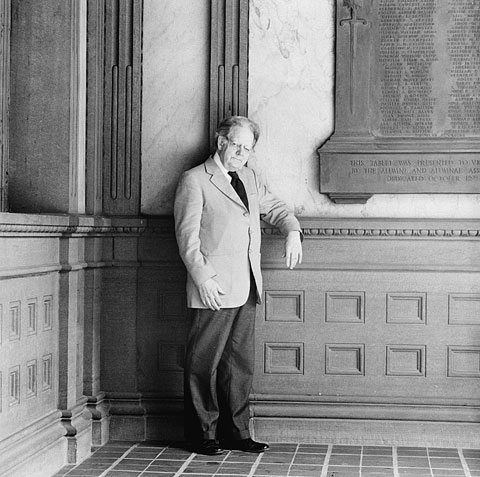Northrop Frye Frasi e Citazioni
Northrop Frye: Frasi in inglese
1:313
"Quotes", Late Notebooks, 1982–1990: Architecture of the Spiritual World (2002)
Origine: "Quotes", Notebooks and Lectures on the Bible and Other Religious Texts (2003), p. 149
Origine: "Quotes", Fearful Symmetry : A Study of William Blake (1947), p. 46
1:73
"Quotes", Late Notebooks, 1982–1990: Architecture of the Spiritual World (2002)
Words with Power : Being a Second Study of The Bible and Literature (1990), Introduction, p. xiii http://books.google.com/books?id=ZnSJb6PPnBoC&pg=PP81&lpg=PP81&dq=%22which+is+inherited,+transmitted+and+diversified+by+literature%22&source=bl&ots=xJ1cLDaUCI&sig=m6agYWMBlW0qfDYMA7aX9aNM8IE&hl=en&sa=X&ei=PaCqUsiEM-issQT_4oGAAg&ved=0CDYQ6AEwAg#v=onepage&q=%22which%20is%20inherited%2C%20transmitted%20and%20diversified%20by%20literature%22&f=false
"Quotes"
Origine: "Quotes", The Great Code: The Bible and Literature (1982), Chapter Three, p. 56
“The primary and literal meaning of the Bible, then, is its centripetal or poetic meaning.”
Origine: "Quotes", The Great Code: The Bible and Literature (1982), Chapter Three, p. 61
"Quotes", Anatomy of Criticism: Four Essays (1957), Mythical Phase: Symbol as Archetype
2:568
"Quotes", Late Notebooks, 1982–1990: Architecture of the Spiritual World (2002)
Origine: "Quotes", The Great Code: The Bible and Literature (1982), Chapter Four, p. 83
Origine: "Quotes", Notebooks and Lectures on the Bible and Other Religious Texts (2003), p. 97
“One person by himself is not a complete human being.”
"Quotes", The Educated Imagination (1963), Talk 1: The Motive For Metaphor http://northropfrye-theeducatedimagination.blogspot.ca/2009/08/1-motive-for-metaphor.html
“We are always in the place of beginning; there is no advance in infinity.”
1:281
"Quotes", Late Notebooks, 1982–1990: Architecture of the Spiritual World (2002)
“A community`s art is its spiritual vision.”
Origine: "Quotes", Notebooks and Lectures on the Bible and Other Religious Texts (2003), p. 206
“This story of loss and regaining of identity is, I think, the framework of all literature.(pg.18)”
"Quotes", The Educated Imagination (1963), Talk 2: The Singing School
"Quotes", The Educated Imagination (1963), Talk 6: The Vocation of Eloquence
Origine: "Quotes", Notebooks and Lectures on the Bible and Other Religious Texts (2003), p. 108
Origine: "Quotes", The Great Code: The Bible and Literature (1982), Chapter 8, p. 199
Introduction, p. xiii
"Quotes", The Great Code: The Bible and Literature (1982)
“Genius is a power of the soul and that powers of the soul can be developed by everyone.”
Origine: "Quotes", Notebooks and Lectures on the Bible and Other Religious Texts (2003), p. 8
"Quotes", Anatomy of Criticism: Four Essays (1957), Mythical Phase: Symbol as Archetype
Origine: "Quotes", The Great Code: The Bible and Literature (1982), Chapter Two, p. 31
"Quotes", The Educated Imagination (1963), Talk 4: The Keys To Dreamland
"Quotes", The Educated Imagination (1963), Talk 2: The Singing School
2:579
"Quotes", Late Notebooks, 1982–1990: Architecture of the Spiritual World (2002)
Origine: "Quotes", The Great Code: The Bible and Literature (1982), Chapter Six, p. 168
"Quotes", The Educated Imagination (1963), Talk 6: The Vocation of Eloquence
2:568
"Quotes", Late Notebooks, 1982–1990: Architecture of the Spiritual World (2002)
Origine: "Quotes", The Great Code: The Bible and Literature (1982), Chapter 8, p. 200
